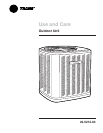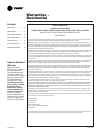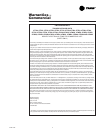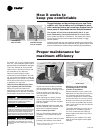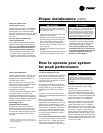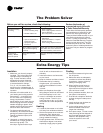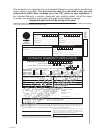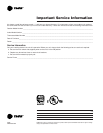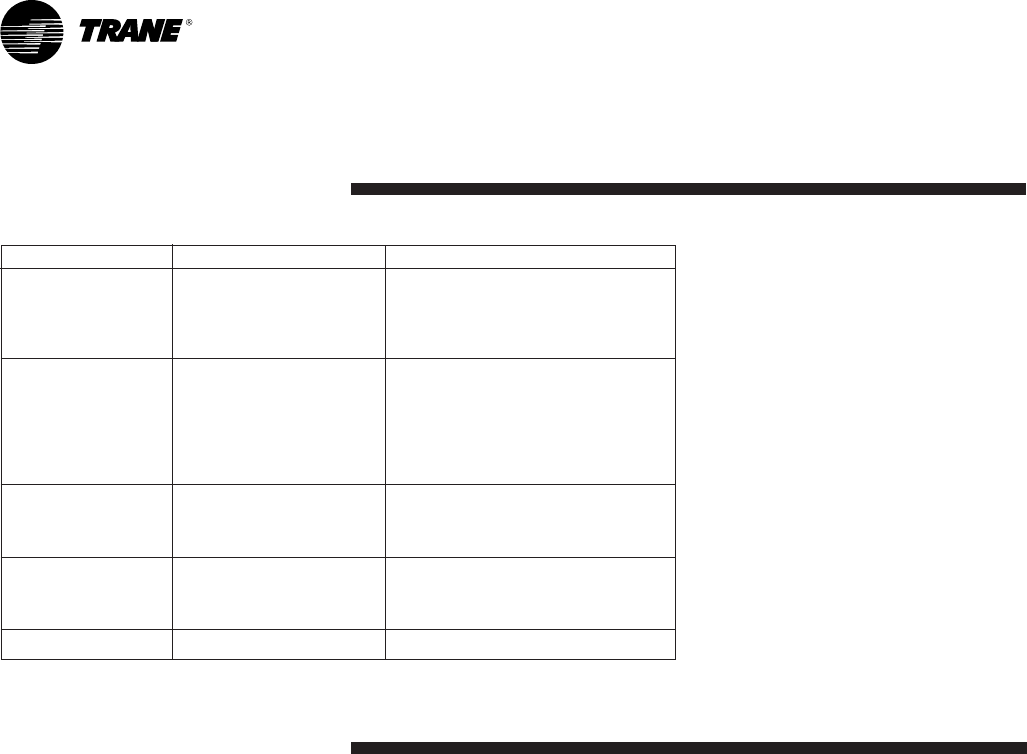
6 22-5214-03
Before you call for service, check the following:
Problem Possible cause Remedy
Insufficient heating a. dirty filters a. clean or replace
or cooling b. air not circulating freely b. check supply registers and return
grills for blockage
c. blocked outdoor coil c. clear away leaves or other debris
Failure to operate a. power off a. make sure main switch is in
ON position
b. open circuit breaker or b. reset circuit breaker, or replace
burned-out fuses burned-out fuses
c. improperly adjusted c. check setting, adjust thermostat
thermostat
Blue auxiliary heat When outdoor temperature Monitor light. If it stays on continuously
light on falls, intermittent lighting when above 30°F, or if it comes on
is normal when 50°F outdoors, call for service.
No Heating or Blower door removed Close door securely to restore power
Cooling – Blower or ajar to blower
does not operate
Unusual Noise Call your local servicer
The Problem Solver
Extra Energy Tips
Insulation
1. Make sure your home is properly
insulated. This is the single most
important step in conserving en-
ergy. Thermal insulation should
be specified in terms of thermal
resistance (R-values). R-30 (10")
is recommended for ceilings,
R-11 (3-1/2") for exterior walls
and floors over unheated areas. In
colder climates, consider additional
insulation.
2. Infiltration of humid outside air is
your heating and cooling system’s
worst enemy — it could account
for 15 to 30% of air conditioning
energy requirements. Find the
places where air can sneak into the
home and plug them with caulking,
weather-stripping or plastic. Also,
weather-strip and caulk around all
entrance doors and windows.
3. Cut heat transfer through your
windows by 40 to 50% with double
glazing (two panes of glass sepa-
rated by a sealed air space) and
low-e glass.
4. Use wood- or metal-frame storm
windows even if single-glazed win-
dows are high quality. The
extra layer of glass and the layer
of still air will cut heat transfer con-
siderably.
5. Install storm doors at all entrances
to your house.
6. Keep all windows and doors closed.
7. Remember that by increasing
the glass area, you increase the
amount of heat added in summer
and lost
in winter.
8. Make sure fireplaces have tight-
fitting dampers which can be closed
when the fireplace is not in use.
9. Invest in a humidifier to conserve
energy in winter. The air in your
home won’t be as dry, so you stay
comfortable at a lower temperature
setting.
Heating
10. Locate the thermostat on an inside
wall away from windows and doors.
11. Set the thermostat as low as wcom-
fort permits. Each degree over
68°F can add 3% to the amount of
energy needed for heating.
12. People generate heat. So lower the
thermostat a degree or two when
expecting a large group of guests.
Cooling
13. Set the thermostat as high as com-
fort will permit.
14. Make sure attics are adequately
ventilated to relieve heat buildup.
If necessary, improve airflow by
adding or enlarging vents.
15. When building a new house or
renovating an old one, choose
light-colored roof shingles to reflect
more of the sun’s heat.
16. During moderate weather, don’t use
the system unnecessarily.
17. Draw blinds or drapes to block the
sunlight during the hottest part of
the day.
18. Install awnings over windows ex-
posed to direct sunlight.
19. In the cooling season, don’t run
kitchen and bath exhaust fans
longer than necessary.
20. Don’t place lamps, TV sets or other
heat producing devices beneath a
wall-mounted thermostat. Rising
heat from the equipment may
cause the system to over-cool
your house.
Reduce the burden of
unexpected repair bills with
a Trane Extended Warranty.
Trane offers the finest quality products
and manufacturer’s warranties on the
market. But, like all good things, the
Trane-provided limited warranty on your
new comfort equipment will come to
an end. To keep you protected, Trane
offers the Extended Warranty Program.
It picks up right where your Trane lim-
ited warranty leaves off. And, it offers
years and years of reliable protection at
a low cost. Ask your dealer for program
details.



